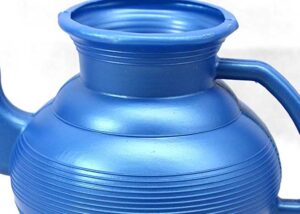If one waits for the last urine drops to come out and then wipes with toilet paper, is the tip of the private organ now legally pure or will it still be considered impure?
Quran
Hadith
Islamic Text
It is legally pure.
عَنْ عَائِشَةَ، أَنَّ رَسُولَ اللَّهِ صَلَّى اللهُ عَلَيْهِ وَسَلَّمَ قَالَ: إِذَا ذَهَبَ أَحَدُكُمْ إِلَى الْغَائِطِ، فَلْيَذْهَبْ مَعَهُ بِثَلَاثَةِ أَحْجَارٍ يَسْتَطِيبُ بِهِنَّ، فَإِنَّهَا تُجْزِئُ عَنْهُ
(Sayidah) Aishah narrated that the Messenger of Allah (ﷺ) said, ‘When one of you goes to relieve himself, he should take with him three stones with which to cleanse himself, for they will be sufficient for him.’ (Abu Dawood 40, Hasan Lighayrihi).
We see from the Hadith above that performing Istinja with stones (or the like) is permitted. Therefore one can be considered to be in a state of purity afterwards. However, there is some difference of opinion amongst Hanafi scholars as to the nature of the purity achieved. Is it complete purity, in that all traces of impurity have been removed? Or is it pure in that the impurity has been reduced to an amount that is usually overlooked but can impact certain legal rulings? The stronger opinion in the Hanafi Madhab is the second opinion, therefore it can cause impurity in certain, rare, situations.
( التقليل بنحو الحجر )
أفاد بذكر التقليل أن حكم النجاسة بعد الحجر باق حتى لو دخل الماء القليل نجسه
Imam Shurunbulali: Reducing it (impurity) with a stone or the like.
Imam Tahtawi: By saying ‘reducing’ he has alluded to the ruling of impurity remaining after using a stone, such that if he were to enter a small body of water he would render it impure. (Haashiyah Tahtawi ala Maraqi al-Falah).
لَوْ اسْتَنْجَى بِغَيْرِ الْمَاءِ ثُمَّ ابْتَلَّ ذَلِكَ الْمَوْضِعُ ثُمَّ أَصَابَ مِنْ ذَلِكَ ثَوْبَهُ أَوْ بَدَنَهُ فَالْمُخْتَارُ أَنَّهُ يَتَنَجَّسُ إنْ كَانَ أَكْثَرَ مِنْ قَدْرِ الدِّرْهَمِ
If he performs Istinja with other than water, and then that part became wet and touched his clothes or body, then according to the strongest opinion it becomes impure, if it is more than the amount of a Dirham. (Imam Ibn Abideen, Rad al-Muhtaar).
So, there are rare situations in which the issue of impurity arises after having performed Istinja with toilet paper (or the like). This is in fact a fairly complicated issue and students must study other related issues to understand it correctly.
Muslims must study the Deen in a comprehensive manner, including a thorough study of Fiqh. Often Q and A is not helpful when it relates to complicated issues if one has not studied them more holistically and it can actually lead to greater confusion or misunderstanding. This is why Q and A should be seen as a supplementary means of learning, and not a substitute to formal lessons.
And Allah (Most High) Knows Best.
– Answered by Shaykh Noorud-deen (10.06.2021)
See also:
Can you do Istinjaa without using water?
Is it sufficient to learn the Deen through questions and answers (Q&A) only?
See also (video):






